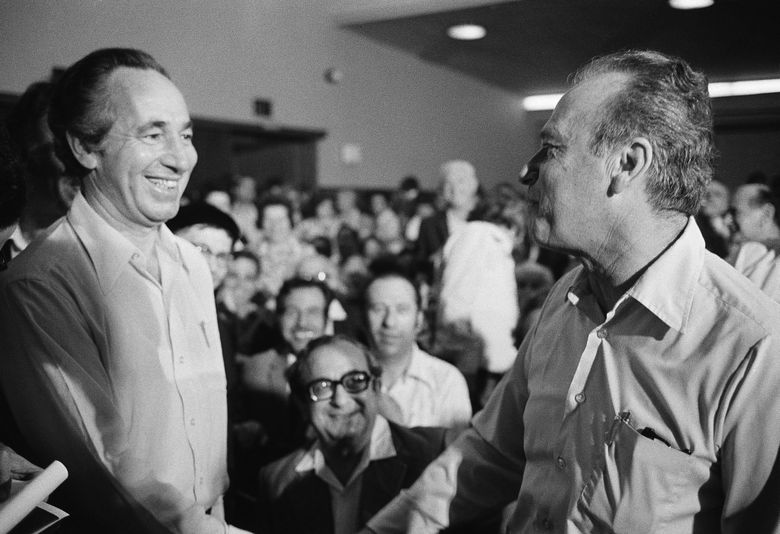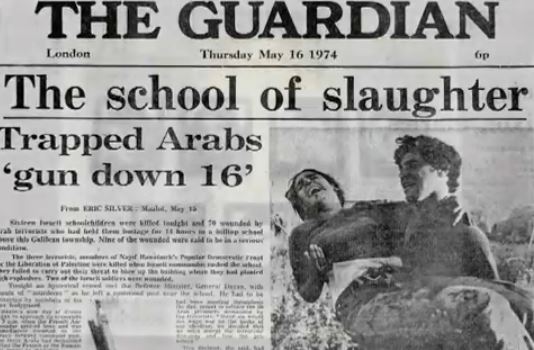Prime Minister of Israel – Golda Meir (Alignment) until 3 June, Yitzhak Rabin (Alignment)
President of Israel – Ephraim Katzir
Chief of General Staff - David Elazar until 3 April, Mordechai Gur
Government of Israel - 15th Government of Israel until 10 March, 16th Government of Israel until 3 June, 17th Government of Israel
Events
18 January – Israel and Egypt sign an agreement on disengagement following the Yom Kippur War.
1 February – Lillehammer affair: Five Israeli Mossad agents are sentenced in Norway to prison terms for the assassination of Ahmed Bouchiki. The prison terms range from two and a half to five years, although all the agents are eventually released within 22 months and deported back to Israel.
5 March – Israel completes its pullback from the west side of the Suez Canal to the east side of the canal, as agreed upon in the Agreement on Disengagement.
Ariel Sharon ( center with the bandage) wih Moshe Dayan at kilometer 47 ( the closest the IDF came to Cairo) . The disengagement Agreement was signed at kilometer 101
10 March – Golda Meir presents her third government to the Knesset.
1 April – The Agranat Commission publishes its interim report, which calls for the dismissal of the IDF's Chief of Staff Dado Elazar, director of the Israeli Military Intelligence Directorate Eli Zeira and the Chief of the Israeli Southern Command Shmuel Gonen. The interim report states that they were responsible for failure in preparing the army for war, and for the operational and intelligence failures which occurred prior to the Yom Kippur War, which resulted in severe consequences of the war. Nevertheless, the Agranat Commission refuses to give an opinion on the responsibility of the political leadership, Prime Minister Golda Meir and the Minister of Defence Moshe Dayan arguing that this is beyond its scope.
11 April – Golda Meir resigns from premiership
15 April – Mordechai Gur is appointed as the tenth Chief of Staff of the Israel Defense Forces.
19 April – Mahanayim disaster: Eight Israeli soldiers are killed as a result of a collision between two helicopters over the Mahanayim Airfield.
31 May – Israel and Syria sign an agreement on disengagement following the Yom Kippur War.

Rabin defeats Shimon Peres to become head of the Labour Party per se the Labour Candidate to follow Golda Meir ( Yitzchak Lavon in the background a future President of Israel)
3 June – Yitzhak Rabin presents his cabinet for a Knesset "Vote of Confidence". The 17th Government is approved that day and the members are sworn in.
Israeli–Palestinian conflict[edit]
The most prominent events related to the Israeli–Palestinian conflict which occurred during 1974 include:
Notable Palestinian militant operations against Israeli targets
The most prominent Palestinian Arab terror attacks committed against Israelis during 1974 include:
11 April – Kiryat Shmona massacre: Three members of the PFLP-GC cross the Israeli border from Lebanon, enter an apartment building in the town of Kiryat Shmona and kill all eighteen residents there, half of whom are children.

Shmuel Levy ,a Sayeret Matkal rescuer caring his wound sister Yael out of the Maalot School
15 May – Ma'alot massacre: Palestinian militants of the Democratic Front for the Liberation of Palestine cross the Israeli border from Lebanon. They attack a van killing two Israeli Arab women, they enter an apartment building in the town of Ma'alot and kill a couple and their 4-year-old son. After that the militant squad take over a local school and hold at 105 students and 10 teachers hostage. The hostage-takers demanded the release of 23 Palestinian militants from Israeli prisons, or they would kill the students. On the second day of the standoff, a unit of the elite Golani Brigade stormed the building. During the takeover the hostage-takers detonated their grenades and shot the children. Ultimately, 25 hostages were killed, including 22 children; 68 more were injured.[2][3]
24–25 June – 1974 Nahariya attack: three Palestinian militant squad infiltrated the coastal city of Nahariya in Israel by sea from Lebanon. During the attack three civilians and one Israeli soldier were killed.
8 September – TWA jet with 88 passengers traveling from Tel Aviv to Athens crashed into the Ionian Sea after PFLP militants detonated a bomb hidden in the baggage compartment, killing all the 79 passengers and 9 crew members on board.
19 November – 1974 Beit She'an attack: a raid by a squad of Palestinian militants, belonging to the Democratic Front for the Liberation of Palestine militant organization, on the Israeli city of Beit She'an. Four civilians were killed during the event and more than 20 civilians were injured.
No comments:
Post a Comment